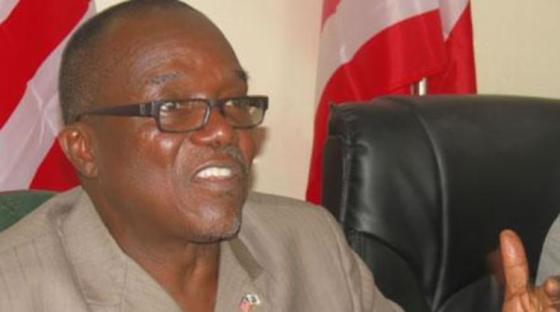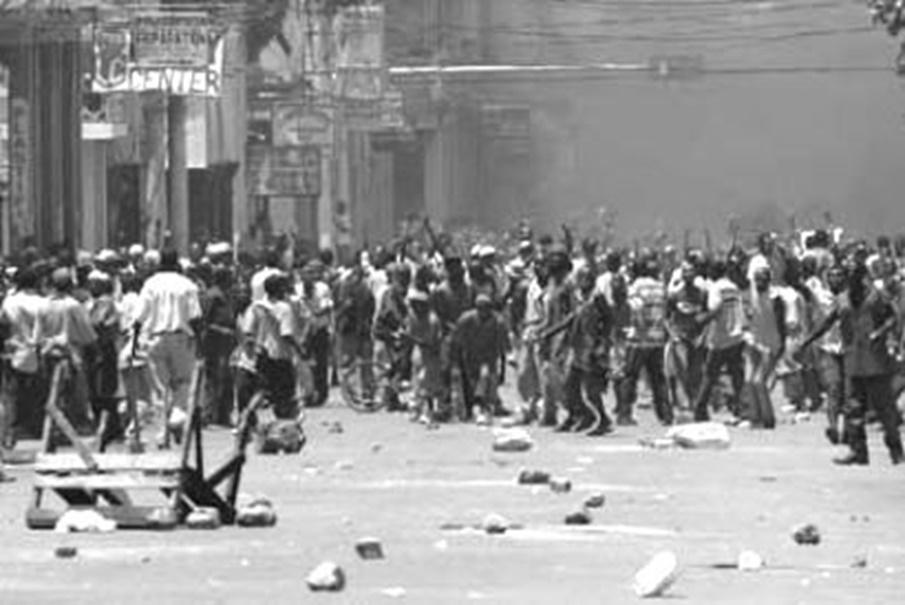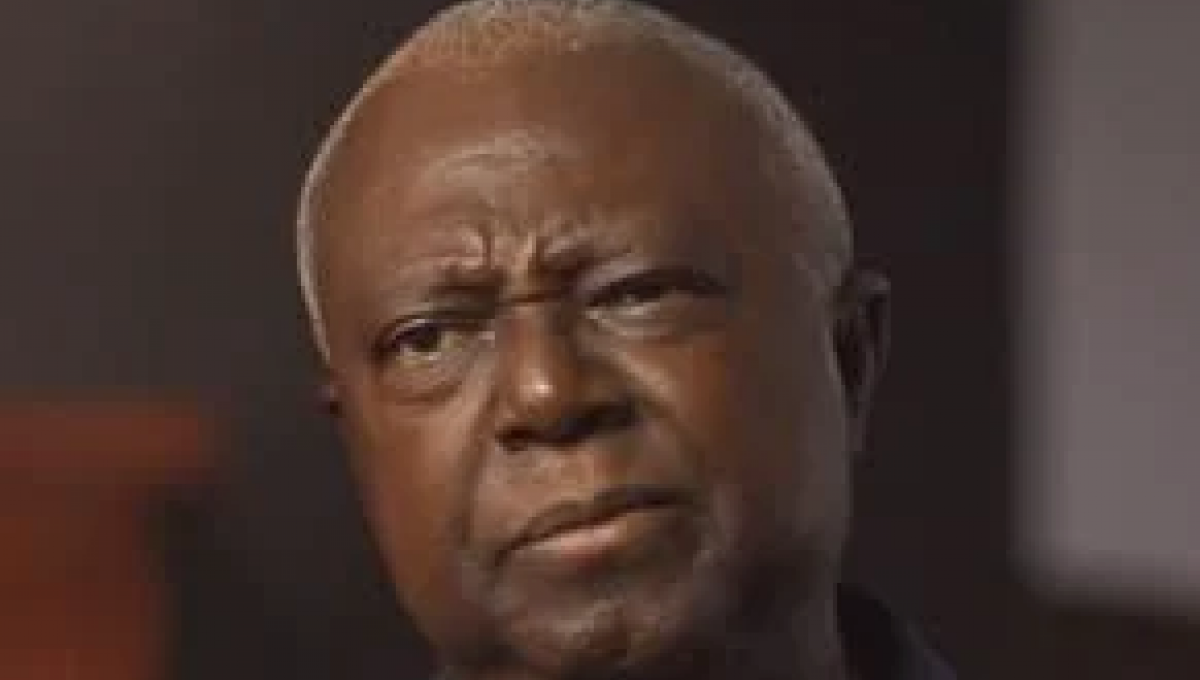Liberia: ‘Extremists Responsible for 1979 Rice Riot’

Senator Conmany B. Wesseh.
Veteran politician, Senator Conmany B. Wesseh, has remarked that April 14, 1979 rice riots occurred as a result of extremism — the intolerance of those who did not want the people to exercise their democratic right of peaceful assembly.
The River Gee County Senator, who entered politics as a student activist, was a member of the Liberia National Students Union (LINSU) during the 1979 rice riots.
Sen. Wesseh on the 43rd anniversary of that deadly event, which he refers to as the “March for Rice and Rights (not rice riots), argued that: “People were killed as a result of extremism. The organizers were not to blame; it was just the intolerance of those who did not want the people to exercise their democratic right of peaceful assembly. Those who were in the leadership of our country at the time — they said Tolbert was a weakling and a show of force would be necessary to control the situation.”
The rice riot, which is one of the bloodiest days in Liberia’s history, came after the Progressive Alliance of Liberia (PAL) had called for a peaceful demonstration in Monrovia to protest a proposed increment in the subsidized price of rice from US$22 per 100-pound bag to US$30.
But the protest ended in chaos with at least 41 demonstrators protesting the proposed increase in the price of rice being shot and killed by army and police forces here, triggering a wave of anarchy that resulted in property damage estimated at $35 million. More than 400 people were injured.

In the days after the riot, at least 40 people were arrested, including Mathews, and he and 13 others were charged with treason, a capital offense, on April 19, three days after the protest. The government announced that the price of rice would not be raised.
The aftermath of the riot, according to Sen. Wesseh clearly shows that the government did not listen and this happens because extreme elements within the government were demanding the then President Tolbert to show strength – leading to a terrifying day where people lost their lives without justifiable cause.
He said though Matthews could have gotten on air and called off the protest, the extremists in the government did not want to even so much as let Matthews have that opportunity, for fear that it would create the impression that he had more control over the situation than the President and his administration.
“The government did not listen, and its extreme elements within the government took over, saying that President Tolbert is weak, and should show strength. On the other hand, the organizers — Bacchus Matthews — you know, he lost it. Because Albert Porte and Dr. Sawyer were going back and forth, talking to everybody, including the government, advising all sides to not go through with their respective planned actions,” Sen. Wesseh disclosed.
“But Bacchus said he could not call off the protest because his followers were already mobilized to take to the streets,” the senator added. “And while he reasoned with peace-brokers to scale down the tension by redirecting the march to the PAL headquarters to have his supporters assemble there, there were also extremists in his group who decided to march straight to the Executive Mansion, determined to demonstrate as originally planned.”
However, according to Sen. Wesseh, the people had already been mobilized by the government propaganda machine. “It was a government propaganda machine, using ELBC and ELWA — the two most widely aired radio stations at the time — to threaten those who would get in the streets to demonstrate.”
Sen. Wesseh added that the bloody outcome would have been avoided if the government had not opened fire — on unarmed protestors.
In May 30, 1979, New York Times article, titled, ‘After Liberia's Costly Rioting, Great Soul-Searching’, in which slain President Tolbert was interviewed — says that days after the shootings, the President described the leaders of the demonstration as “wicked, evil and satanic men” who wanted “to bring chaos and disorder in the country with the eventual objective of overthrowing the Government.”
In the Times interview, President Tolbert reiterated his view that the rice issue was merely an alibi, put forth by men “whose principal idea is to change our system of government” and leaving the regime no alternative but to assert its authority.
“When they did not check the demonstration by using water or tear gas, then the next thought was to fire in the air. That made no effect. Not until they were very near to the mansion with whatever plans they had in mind to do, then someone got injured from the security side.”
“I said, ‘Well, in that case, if you have to.’ They wanted to get the authority to retaliate. I said, ‘If you have to fire, fire’ — a firing in the air wouldn't suffice —‘fire down in the extremities,’ so that there wouldn't be more danger, that is, more fatal activities. That made no difference. Then everything got out of control.”
Rice – before the riot was already an explosive issue – since US$22 for a 100-pound bag was a major expense for a family back then as the average monthly wage was US$80. Most of the rice consumed was imported; its consumption was a significant drain on foreign reserves, earned through the export of the country’s natural resources.
Since most of the rice is imported, its consumption also represents a significant drain on foreign reserves, earned through the export of iron, rubber, timber, and diamonds and the registration of many of the world's ships under a “flag of convenience.”
In a bid to stimulate domestic production, the then Agriculture Minister Florence Chenoweth argued that increasing the price to $30 a bag would stimulate local rice farmers – claiming that farmers were losing money, to increase production and hasten Liberian self-sufficiency – a recommendation which President Tolbert was looking into before the riot occurred.
Chenoweth asserted that the increase would serve as an added inducement for rice farmers to stay on the land and produce rice as both a subsistence crop and a cash crop, instead of abandoning their farms for jobs in the cities or on the rubber plantations.
However, political opponents criticized the proposal as self-aggrandizement, pointing out that Chenoweth and the family of President William Tolbert operated large rice farms and would therefore realize a tidy profit from the proposed price increase
In 12 hours of violence in the city's streets, at least 40 civilians were killed, and more than 400 were injured – protesting the proposed increment in the price of the country’s staple food.
Meanwhile, the account by Sen. Wesseh reflects that of the late veteran politician and scholar of political science Dr. Amos Claudius Sawyer. Dr. Sawyer, in an interview with the Daily Observer just months before his death, argued that the 1979 rice riots and 1980 coup could have been avoided, had the government listened and given the needed attention to its people.
Dr. Sawyer explained that the PAL had no idea of what their protest against the increment in the price of rice could have done to the country’s peace.
“There was never a need for violence,” Dr. Sawyer explains. “The Liberian government then failed to negotiate with the people on the increment of the price of rice, the country’s staple food. PAL called the demonstration but had no idea of how it could have gone. People came out in their numbers and flooded the streets. The police went out fighting.”
He said before the demonstration, he spoke with Matthews and asked him to call off the protest to avoid the unexpected. According to Sawyer, Matthews agreed but decided to wait until the following morning, April 14, 1979, to call off the protest via radio announcement. However, by the morning of April 14, people from all walks of life had crowded the streets, ready to protest, in adherence to the original announcement.
“The leaders of PAL had thought that there would have been a different scenario. They never had a way to control the people. It was an unfortunate situation,” the late Dr. Sawyer explained in the Observer interview. Lots of top people went out to advise PAL to stop the demonstration. There is also this thing about our government. They think that no one should challenge them or question them.”
Albert Porte, according to accounts from his famous article, “The Day Monrovia Stood Still”, as reflected upon in his nephew Kenneth Y. Best's book, Albert Porte: A Lifetime Trying to Save Liberia, recalled that he (Porte) managed to convince the PAL to commit to calling off their demonstration and instead have a peaceful assembly at the PAL headquarters.
He then communicated this new development to President Tolbert. “Mr. President, I have things under control,” Porte told Tolbert. “PAL authorities are asking for one 'assurance' from the government — that the government keeps the security in the background and they would call off the demonstration.” Mr. Porte then suggested a compromise.
"Government cannot compromise!" the President responded, in what Mr. Porte described as a tone of ‘stubborn determination.
Porte tried to reason with the President that the compromise would enable both parties to scale down the tension and that the President and his administration would save face and, most of all, avoid a national crisis.
While this was going on, a police riot squad had already descended on the PAL office and ransacked the place with tear gas, breaking up furniture and seizing equipment and documents, and dispersed those who were gathered there.
Meanwhile, Sen. Wesseh has said that looking at the deadly past, what Liberia as a country can do now is to allow neither right-wing or left-wing extremists to take leadership of the country. Instead, “Liberians should now learn to operate in the confines of the legal system,” he said.

